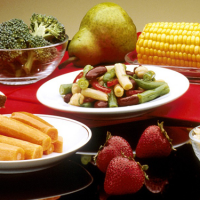The Healthiest Foods You Can Get To Stay Fit
Eating healthy is not just a trend; it’s a lifestyle. Choosing nutrient-dense foods can improve your energy levels, boost your immune system, and help you maintain overall well-being. In this article, we explore the healthiest foods you can get, breaking down their benefits and explaining why they should be a staple in your diet.
1. Leafy Green Vegetables: Nature’s Nutritional Powerhouses
Leafy greens like spinach, kale, Swiss chard, and arugula are packed with essential vitamins, minerals, and antioxidants. They are low in calories yet high in fiber, which promotes digestive health.
- Nutrients: Rich in vitamins A, C, and K, as well as iron, calcium, and magnesium.
- Benefits: Help reduce inflammation, improve bone health, and lower the risk of chronic diseases like heart disease and diabetes.
- How to Include Them: Add them to salads, smoothies, or sauté them as a side dish.
2. Berries: Antioxidant-Rich Superfoods
Blueberries, strawberries, raspberries, and blackberries are not only delicious but also incredibly nutritious. They are loaded with antioxidants, which help combat oxidative stress and reduce the risk of chronic diseases.
- Nutrients: High in vitamin C, fiber, and phytochemicals like anthocyanins.
- Benefits: Improve brain function, promote heart health, and support healthy skin.
- How to Include Them: Use them as a topping for oatmeal, yogurt, or enjoy them as a snack.
3. Fatty Fish: The Omega-3 Essential
Fatty fish such as salmon, mackerel, sardines, and trout are excellent sources of omega-3 fatty acids, which are crucial for brain and heart health.
- Nutrients: High in omega-3s, protein, vitamin D, and selenium.
- Benefits: Reduce inflammation, lower blood pressure, and improve brain function.
- How to Include Them: Grill, bake, or pan-sear fish for a quick and healthy meal.
4. Nuts and Seeds: Compact Nutritional Power
Almonds, walnuts, chia seeds, flaxseeds, and sunflower seeds are packed with healthy fats, protein, and essential nutrients. They provide sustained energy and keep you feeling full for longer.
- Nutrients: Rich in vitamin E, magnesium, and omega-3 fatty acids.
- Benefits: Support heart health, improve brain function, and reduce inflammation.
- How to Include Them: Add them to smoothies, salads, or use as a topping for cereal.
5. Whole Grains: Fiber-Rich Energy Sources
Whole grains such as quinoa, brown rice, oats, and barley are an excellent source of fiber, vitamins, and minerals. Unlike refined grains, they retain their nutrient-rich bran and germ.
- Nutrients: High in B vitamins, iron, magnesium, and dietary fiber.
- Benefits: Regulate blood sugar levels, improve digestion, and reduce the risk of heart disease.
- How to Include Them: Use whole grains as a base for salads, soups, or breakfast bowls.
6. Cruciferous Vegetables: Detoxifying Agents
Vegetables like broccoli, cauliflower, Brussels sprouts, and cabbage are rich in sulfur-containing compounds, which help support the body’s detoxification processes.
- Nutrients: High in fiber, vitamin C, and compounds like glucosinolates.
- Benefits: Promote liver health, support immune function, and reduce cancer risk.
- How to Include Them: Steam, roast, or stir-fry them for a delicious side dish.
7. Eggs: The Perfect Protein
Eggs are one of the most nutritious foods on the planet, offering a complete protein source and a wide range of essential nutrients.
- Nutrients: High in protein, vitamin B12, choline, and selenium.
- Benefits: Support brain health, promote muscle repair, and provide lasting energy.
- How to Include Them: Enjoy them boiled, scrambled, or in omelets.
8. Legumes: Plant-Based Protein Champions
Legumes such as lentils, chickpeas, black beans, and kidney beans are affordable, versatile, and packed with nutrients.
- Nutrients: Rich in protein, fiber, iron, and folate.
- Benefits: Help lower cholesterol, regulate blood sugar, and support gut health.
- How to Include Them: Use them in soups, salads, or as a base for plant-based burgers.
9. Avocados: The Heart-Healthy Fruit
Avocados are unique among fruits because they are rich in healthy monounsaturated fats, which are beneficial for heart health.
- Nutrients: High in potassium, vitamin E, and fiber.
- Benefits: Lower bad cholesterol levels, improve skin health, and support weight management.
- How to Include Them: Spread on toast, blend into smoothies, or add to salads.
10. Greek Yogurt: A Probiotic-Rich Dairy Option
Greek yogurt is a fantastic source of probiotics, protein, and calcium, making it an excellent choice for digestive health.
- Nutrients: High in protein, calcium, and live bacterial cultures.
- Benefits: Support gut health, strengthen bones, and promote muscle recovery.
- How to Include It: Enjoy it with berries and honey or use it as a base for smoothies.
11. Garlic and Onions: Flavorful Immunity Boosters
Garlic and onions are not only culinary staples but also health powerhouses. They are rich in compounds that enhance immunity and improve heart health.
- Nutrients: Contain allicin, sulfur compounds, and antioxidants.
- Benefits: Lower blood pressure, fight infections, and reduce the risk of certain cancers.
- How to Include Them: Use them as a base for soups, stews, or stir-fries.
12. Sweet Potatoes: A Nutrient-Dense Carb
Sweet potatoes are an excellent source of complex carbohydrates and a host of essential nutrients.
- Nutrients: High in beta-carotene, vitamin C, and potassium.
- Benefits: Support eye health, boost the immune system, and provide long-lasting energy.
- How to Include Them: Roast them, mash them, or use them in soups.
Eating healthy doesn’t have to be complicated. By incorporating these nutrient-dense foods into your daily diet, you can enjoy a variety of flavors while boosting your overall health. Focus on balance and variety to get the most out of these superfoods.










